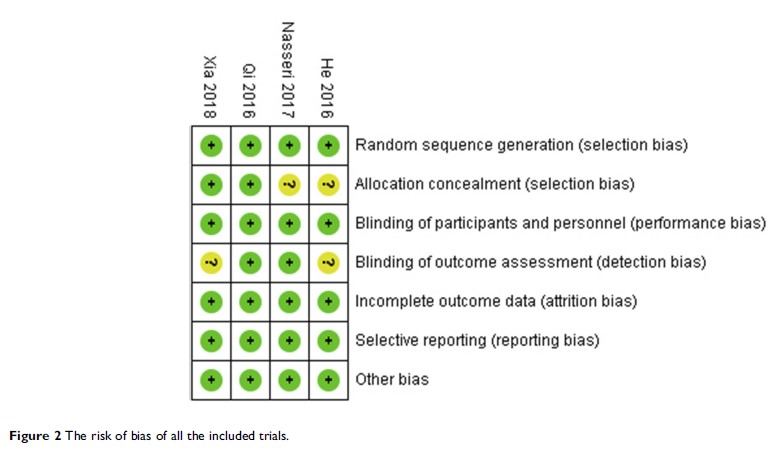9 0 8 1 0
论文已发表
注册即可获取德孚的最新动态
IF 收录期刊
- 2.6 Breast Cancer (Dove Med Press)
- 3.9 Clin Epidemiol
- 3.3 Cancer Manag Res
- 3.9 Infect Drug Resist
- 3.6 Clin Interv Aging
- 4.8 Drug Des Dev Ther
- 2.8 Int J Chronic Obstr
- 8.0 Int J Nanomed
- 2.3 Int J Women's Health
- 3.2 Neuropsych Dis Treat
- 4.0 OncoTargets Ther
- 2.2 Patient Prefer Adher
- 2.8 Ther Clin Risk Manag
- 2.7 J Pain Res
- 3.3 Diabet Metab Synd Ob
- 4.3 Psychol Res Behav Ma
- 3.4 Nat Sci Sleep
- 1.9 Pharmgenomics Pers Med
- 3.5 Risk Manag Healthc Policy
- 4.5 J Inflamm Res
- 2.3 Int J Gen Med
- 4.1 J Hepatocell Carcinoma
- 3.2 J Asthma Allergy
- 2.3 Clin Cosmet Investig Dermatol
- 3.3 J Multidiscip Healthc

在脊髓麻醉期鞘内注射右美托咪定对剖宫产的影响:随机试验的荟萃分析
Authors Wang YQ, Zhang XJ, Wang Y
Received 20 March 2019
Accepted for publication 8 August 2019
Published 21 August 2019 Volume 2019:13 Pages 2933—2939
DOI https://doi.org/10.2147/DDDT.S207812
Checked for plagiarism Yes
Review by Single-blind
Peer reviewers approved by Dr Colin Mak
Peer reviewer comments 2
Editor who approved publication: Dr Qiongyu Guo
Objective: Intrathecal dexmedetomidine has been used in spinal anesthesia during cesarean sections. The purpose of this meta-analysis was to investigate the effect of intrathecal dexmedetomidine on the adverse reactions of spinal anesthesia during cesarean section.
Methods: We searched for relevant studies using PubMed, Web of Science, and the Cochrane library. After screening studies and extracting data, we performed a meta-analysis on the effect of intrathecal dexmedetomidine during cesarean section.
Results: A total of 278 patients from 4 studies were included in this meta-analysis. The incidence of shivering in the dexmedetomidine groups was significantly lower than that in the placebo groups during cesarean section (RR=0.40, 95% CI [0.25, 0.65], P =0.0002). Intrathecal dexmedetomidine had no effect on nausea and vomiting (RR=1.08, 95% CI [0.68, 1.71], P =0.74), bradycardia (RR=1.33, 95% CI [0.31, 5.76], P =0.70), and hypotension during cesarean section (RR=0.78, 95% CI [0.59, 1.03], P =0.08).
Conclusion: Intrathecal dexmedetomidine can effectively reduce the occurrence of shivering during cesarean section, but it does not affect the occurrence of nausea and vomiting, bradycardia or hypotension.
Keywords: dexmedetomidine, cesarean section, spinal anesthesia, adverse reactions
